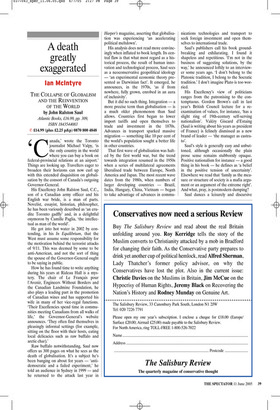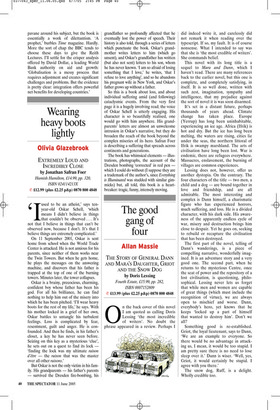A death greatly exaggerated
Ian McIntyre
THE COLLAPSE OF GLOBALISM AND THE REINVENTION OF THE WORLD by John Ralston Saul Atlantic Books, £16.99, pp. 309, ISBN 1843544083 ✆ £14.99 (plus £2.25 p&p) 0870 800 4848 ‘Canada,’ wrote the Toronto journalist Michael Valpy, ‘is the only country in the world where you can buy a book on federal-provincial relations at an airport.’ Things are looking up. Travellers eager to broaden their horizons can now curl up with this extended disquisition on globalisation by the consort of Canada’s outgoing Governor-General.
His Excellency John Ralston Saul, C.C., son of a Canadian army officer and his English war bride, is a man of parts. Novelist, essayist, historian, philosopher, he has been variously described as ‘an erudite Toronto gadfly’ and, in a delightful oxymoron by Camille Paglia, ‘the intellectual as man of the world’.
He got into hot water in 2002 by contending, in his In Equilibrium, that the West must assume some responsibility for the motivation behind the terrorist attacks of 9/11. This was deemed by some to be anti-American, and not the sort of thing the spouse of the Governor-General ought to be saying in public.
How he has found time to write anything during his years at Rideau Hall is a mystery. The chair of Le Français pour l’Avenir, Engineers Without Borders and the Canadian Landmine Foundation, he also plays a leading part in the promotion of Canadian wines and has supported his wife in many of her vice-regal functions. ‘Their Excellencies spend time in communities meeting Canadians from all walks of life,’ the Governor-General’s website announces. ‘They often find themselves in pleasingly informal settings (for example, sitting on the floor with their hosts, eating local delicacies such as raw buffalo and arctic char).’ Raw buffalo notwithstanding, Saul now offers us 300 pages on what he sees as the death of globalisation. It’s a subject he’s been banging on about for years — ‘antidemocratic and a failed experiment,’ he told an audience in Sydney in 1999 — and he returned to the attack last year in Harper’s magazine, asserting that globalisation was experiencing ‘an accelerating political meltdown’.
His analysis does not read more convincingly when inflated to book length. Its central flaw is that what most regard as a historical process, the result of human innovation and technological process, Saul sees as a neoconservative geopolitical ideology — ‘an experimental economic theory presented as Darwinian fact’. It emerged, he announces, in the 1970s, ‘as if from nowhere, fully grown, enrobed in an aura of inclusivity’.
But it did no such thing. Integration — a more precise term than globalisation — is a much older phenomenon than Saul allows. Countries first began to lower import tariffs and open themselves to trade and investment in the 1870s. Advances in transport sparked massive migration — something like 10 per cent of the world’s population sought a better life in other countries.
That first wave of globalisation was halted by the first world war, but the trend towards integration resumed in the 1950s when a series of multilateral agreements liberalised trade between Europe, North America and Japan. The most recent wave dates from the 1980s, when numbers of larger developing countries — Brazil, India, Hungary, China, Vietnam — began to take advantage of advances in commu nications technologies and transport to seek foreign investment and open themselves to international trade.
Saul’s publishers call his book groundbreaking and exhilarating. I found it shapeless and repetitious. ‘I’m not in the business of suggesting solutions, by the way,’ he announced loftily to an interviewer some years ago. ‘I don’t belong to the Platonic tradition, I belong to the Socratic tradition.’ I don’t imagine Plato is too worried.
His Excellency’s view of politicians ranges from the patronising to the contemptuous. Gordon Brown’s call in last year’s British Council lecture for a reexamination of values, for instance, ‘has a slight ring of 19th-century self-serving nationalism’. Valéry Giscard d’Estaing (Saul is writing about his years as president of France) is felinely dismissed as a new brand of leader — ‘the manager as castrato’.
Saul’s style is generally easy and unbuttoned, although occasionally the plain prose sense remains stubbornly opaque. Positive nationalism for instance — a good thing in his book — he defines as ‘a belief in the positive tension of uncertainty’. Elsewhere we read that ‘family as the measure or structure of society is a mafia argument or an argument of the extreme right’. And what, pray, is postmodern dumping?
Saul dances a leisurely and discursive pavane around his subject, but the book is essentially a work of dilettantism. ‘A prophet,’ burbles Time magazine. Hardly. More the sort of chap the BBC tends to choose these days to give the Reith Lectures. I’ll settle for the crisper analysis offered by David Dollar, a leading World Bank authority on aid and growth: ‘Globalisation is a messy process that requires adjustment and creates significant challenges and problems. But the evidence is pretty clear: integration offers powerful net benefits for developing countries.’



















































 Previous page
Previous page